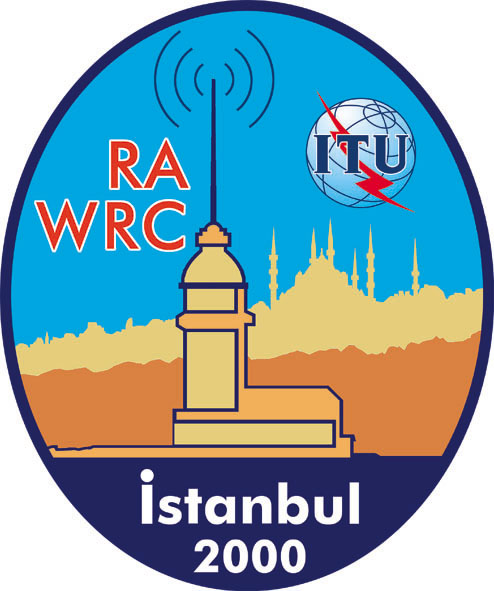
World Radiocommunication Conference 2000
Telephone: +41 22 730 6039
Fax: +41 22 730 5939
E-mail: pressinfo@itu.int
 |
World Radiocommunication Conference 2000 |
|
Telephone: +41 22 730 6039 |
Address by Mr. Robert W. Jones
Director, Radiocommunication Bureau
At the Opening Session of the Radiocommunication Assembly
1 May 2000
Mr. Secretary-General,
Mr. Deputy Secretary-General,
Fellow Directors,
Ladies and Gentlemen,
Dear Colleagues and Friends
I am honoured to address the first ITU Radiocommunication Assembly held outside Geneva. I would like to thank the Turkish Administration which invited here to Istanbul the Radiocommunication Assembly, the World Radiocommunication Conference and the meetings that will take place during the week after the WRC. The efforts made to provide us with such warm and generous hospitality and the outstanding commitment to ensure the availability of facilities are to be commended since they are a clear indication of the importance that Turkey attributes to telecommunications and, in particular, to the International Telecommunication Union. I am sure all participants will join me in thanking our hosts for having made possible this event in Istanbul.
As you may be aware, this Radiocommunication Assembly is perhaps unique, not just because it is the first RA to be held outside of Geneva. The number of issues to be discussed is indeed challenging and will require special understanding and cooperation on the part of all, due to the very limited time available. Many of these issues result from important changes decided by the Plenipotentiary Conference which require a continuous effort to make the activities of the Radiocommunication Study Groups and, indeed the entire Sector, more efficient.
A point to bear in mind is that, in the future, Assemblies do not need to be associated with World Radiocommunication Conferences, nor do there need to be two Assemblies between Plenipotentiary Conferences (No. 27 of the Convention refers). While this may alleviate certain organizational difficulties, it will also have an impact on the procedures and programme of work carried out in the interval between the Assemblies. In accordance with No. 33 of the Convention, this Assembly can make a recommendation on the convening of the next Assembly. I would suggest that you give some thought, therefore, during this week as to when the next Assembly should be convened and, perhaps to the periodicity of future Assemblies. This timing may have an impact on the role of the Assembly vis-à-vis future World Radiocommunication Conferences and the Radiocommunication Advisory Group. According to No. 33 of the Convention, your recommendation shall be submitted to the World Radiocommunication Conference 2000 for comments for the attention of Council 2000. Whatever decision is ultimately made, it is important to recognize the essential role of the Assembly as regards the activities of the ITU-R Study Groups.
In fact, only the Radiocommunication Assembly can provide a procedural framework, agreed by all Member States and Sector Members, by which the Study Groups can operate efficiently. This framework is reflected in the set of ITU-R Resolutions approved by the Assembly and constantly updated to meet the challenges of a fast moving environment.
Other important decisions of the Plenipotentiary Conference, directly related to the activities of the Sector, will need to be discussed and possibly reflected in suitable Resolutions. One of the most important decisions relates to the approval of Recommendations not having regulatory content. The categorization of Questions into those having and those not having regulatory content will merit your special attention. Decisions are also required on a suitable mechanism to approve such Recommendations not having regulatory content.
Another issue of particular relevance is related to the new category of associate member. This should have the advantage of broadening participation in ITU-R Study Group work. At this Assembly, a careful definition of the role of associate members should be reflected in the relevant ITU-R Resolutions.
Another traditional duty of the Radiocommunication Assembly is the organization of the work of the Study Groups and, in particular, the establishment of new Study Groups. This Assembly will be called upon to decide on the merger of two major Study Groups, which have existed for fifty years, by establishing a single Study Group on broadcasting. The definition of the scope of this new Study Group has been the subject of a number of recent informal discussions.
Another traditional and important task is the appointment of Study Group Chairpersons and Vice-Chairpersons and other officers. A hopefully improved version of Resolution 15 has been drafted for your consideration. It is intended to make the appointment process even more transparent and efficient.
I have so far not mentioned the reform process currently underway in the ITU which will culminate in decisions which will be taken by the Council and by the next Plenipotentiary Conference. The decisions that this Assembly is called upon to take demonstrate that there is an ongoing need for a mechanism like this Assembly but you should be thinking of how to improve it and, as Member States and Sector Members, providing your input to the Working Group on ITU Reform.
The Chairperson of this Radiocommunication Assembly faces an overwhelming task in ensuring the success of the Assembly but I am sure that, as in the past, all of you will continue to offer your cooperation and I can assure you that, as always, the Radiocommunication Bureau and I personally will do our utmost to help you in making this Assembly a success.
The next five days will be quite intense. I cannot over-emphasize the need for careful management of the very limited time available. And with that admonition, let me end my remarks here.
Thank you.
| Newsroom Home | Search the Newsroom | Contact
the ITU Press & Public Information Service |